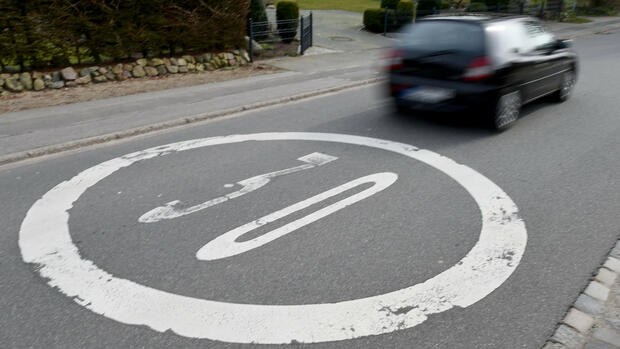With the draft that has now been submitted, authorities could protect the population from noise and exhaust fumes and reorganize traffic in terms of urban development.
(Photo: dpa)
Berlin The traffic light coalition has agreed on a reform of road traffic law. It opens up the possibility for municipalities to set up 30 km/h zones in front of schools or day care centers in the future in order to increase road safety.
Traffic-restricting measures can also be justified in order to reduce emissions of both carbon dioxide and particulate matter from vehicles. This emerges from a corresponding draft law, which is available to the Handelsblatt and has been coordinated within the federal government.
“I am pleased that the long-awaited cabinet decision is getting closer with the submission of this draft bill,” said the rapporteur for the SPD parliamentary group, Mathias Stein, to the Handelsblatt.
The rapporteur for the Greens, Swantje Michaelsen, added: “The municipalities have been waiting for this amendment for a long time because the current legal situation creates unnecessarily high hurdles for the arrangement of zebra crossings, cycle paths and bus lanes.”
The compromise ends a months-long dispute between the FDP and the Greens, which, like many other projects, could not be resolved. Instead, with the fundamental agreement on the Building Energy Act and the future renewal of the heating system in Germany, a breakthrough seems to have been achieved in many controversial areas of transport policy.
In the future, municipalities will be able to protect their residents from noise and exhaust fumes
According to the draft law on road traffic law, the authorities should be given the opportunity “to take the goals of climate and environmental protection, health and urban development into account even more than before, in order to open up new decision-making leeway for states and municipalities,” says the draft. These goals are “equally important alongside the goals of safety and ease of transport”.
Wissing had previously insisted that safety and ease of traffic must always have priority over other reasons for traffic-impairing measures.
(Photo: dpa)
The note is significant in that the Federal Minister of Transport, Volker Wissing (FDP), had previously insisted that safety and ease of use in traffic must always have priority over other reasons for traffic-impairing measures.
He also initially did not want to allow any fundamental changes to the law, but only wanted to create additional options by means of ordinances. Now the goals are “equal in law”, praised the Green Michaelsen. This is “a first step in the right direction”. Just like SPD politician Stein, she still wants to enforce “that the municipalities really get the decision-making leeway agreed in the coalition agreement for the design of local traffic”.
With the draft that has now been submitted, authorities could now protect the population from noise and exhaust fumes and reorganize traffic in terms of urban development. They may also provide preventive protection against harmful environmental influences. Previously, traffic-restricting measures were only possible if there was evidence of accidents or other damage.
Wissing also accommodates the federal states. In the future, municipalities should be able to order more resident parking spaces “in order to avoid significant parking pressure” – even if this is foreseen and does not yet exist.
Municipalities will also be able to set up special lanes in the future, in which, for example, “only electrically or hydrogen-powered vehicles or vehicles occupied by several people” may drive.
>> Read here: Why building in Germany is becoming increasingly difficult
The reason given in the draft is that they have different “driving and noise characteristics” compared to vehicles with conventional combustion engines or that they help fewer cars on the roads.
Coalition ends dispute over many proposed laws
In addition to road traffic law, other important projects have now been sent from the waiting list to the legislative process in order to introduce them to the Bundestag before the parliamentary summer recess. Requests for changes can then be introduced there before the draft goes into the legislative vote.
Economics Minister Volker Habeck (Greens) put the amendment to the Climate Protection Act in the departmental vote. It is intended to relieve the transport minister and the building minister from the obligation to implement immediate measures every year if too much carbon dioxide has been emitted in traffic or in the state of buildings.
The long-controversial law to speed up planning and approval procedures for infrastructure projects is also to be debated in Parliament for the first time in the coming week.
It provides for more than 100 road projects to be declared “overriding public interest” and thus given priority in court cases over other issues such as environmental protection and nature conservation. The Greens had rejected this for a long time and put in their fundamental veto on the construction of new motorways.
In return, Minister Wissing pushed the reform of the truck toll through the cabinet this week. With it, trucks weighing 3.5 tons or more are to pay twice as much toll as before from December.
The FDP actually wanted to increase the new carbon dioxide component gradually with the increasing range of climate-neutral heavy-duty vehicles and not to raise the maximum rate permitted under European law right from the start.
>> Read here: Wissing wants to build motorways faster – also for military emergencies
Now the state will immediately take around seven billion euros extra, of which around five billion euros should be available for the rail network after deducting the collection costs. So far, the income from the toll has flowed exclusively into the road. The Greens had insisted on an end to this regulation.
More: “Almost a step joke” – Scholz disappoints the prime ministers in the planning process
